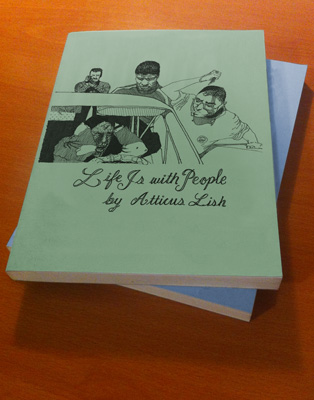The Birds’ Ulterior Motives Get Them Killed: An Interview with Craig Morgan Teicher

Congratulations on Cradle Book, published by BOA in 2010. It is a lovely book of what I thought were fable-like prose poems. But BOA has listed the book as fiction. Do you see it as a work of fiction?
Life Is with People by Atticus Lish

There was a new release from Tyrant Books yesterday. Life Is with People by Atticus Lish is 120 pages of illustrations and text by Atticus. The covers come in four different colored papers. They are thick and nice. The illustrations and text are printed on composition (lined) paper that is thick and nice. This isn’t something I can really try to sell to you. You either like it, or you do not. You either get it, or you do not. I am not saying one is better than the other. Personally, I see each page as a poem that takes awhile to sink in. I can’t really look at too many of them in one sitting. I once looked at a stack of 300 of them in one sitting and felt mental and ill for ten hours afterward. These books cost $20 to make, so I am selling them for $20. If we sell all of them, we break even. I’m not being all, “Look how generous I am.” I am being all, “I think this book is so important that I do not want any kind of deterrence from buying it for those who may not be able to afford it.” Book design by the good-eyed Ryan P. Kirby. There were only 500 of these produced. Do not hesitate. Actually, I am so behind this book that if you order one and think it was not worth your money, you can call me and tell me why and if you make one iota of sense, I will reimburse you. Cool? Cool. Thank you kindly.
The books is available through SPD, the Tyrant website, and will be in limited stores very soon.
[Previews at Vice.]
ToBS R2: ‘lyric essays’ vs. middle age white male self published sci fi novel pt 1 of 4

[matchup #47 in Tournament of Bookshit]
Thompa peered into the tinted windows of Captain Mnooble’s hovercraft, which hummed in the hovercraft hovering-lot, just outside the Sunfleet Academy. His heart raced and he could feel his green blood pulse quicker through his four aortas. Was the Captain still inside, staring back at Thompa, wondering if he was good and blinka enough to succeed him as leader of The Walkers?
*
In more shallow waters, sea cucumbers can form dense populations. The strawberry sea cucumber (Squamocnus brevidentis) of New Zealand lives on rocky walls around the southern coast of the South Island where populations sometimes reach densities of 1,000 animals per square metre. For this reason, one such area in Fiordland is simply called the strawberry fields. READ MORE >
ToBS R2: trolling for spelling errors in blog posts vs Sewage Treatment Technologies

[matchup #46 in Tournament of Bookshit]
Coming off their tedious win over those posting constant facebook photos, those Trolling for spelling errors in blog posts were feeling self-important & in the zone going into their game against Sewage Treatment Technologies. Little did Trolling for spelling errors in blog posts know, Sewage Treatment Technologies had a secret weapon they had not revealed in their win against The Pulitzer Prize, in the form of the lanky Roman center, Chiara Barzini. She quoted a passage from her forthcoming book:«If you attack, make sure you say things that really creep under the skin. A threat that always scares Romans off is: “Your sewage goes into pipes laid in 735 B.C. You are shitting into the past.”» And then she preceded to divulge the intricate inner-workings of Rome’s sewage system. Trolling for spelling errors in blog posts were thrown into confusion—not only was this sequence of words unseen previously in any blog post, but by self-revealing such vulnerabilities in the Roman sewage system, Sewage Treatment Technologies took away the sense of discovery from Trolling for spelling errors in blog posts, rendering them mute. Taking a cue from the movie Brazil, the all-purpose guard-forward Harry Tuttle (played by Robert Deniro) rerouted the online sewage pipes to flood all blog posts, leaving Trolling for spelling errors in blog posts to drown in their own shit. READ MORE >
Finding, stalking, and interviewing writers who haven’t published in a while: Dustin Long
Seems like some authors just disappear. They publish a great book and then nothing for five years until I’m starring at my bookshelf and come across their book and think “Why didn’t so and so publish another book?” This happened recently when I found ICELANDER by Dustin Long in a stack on my bedroom floor. I love this book. It’s weird and whimsical and there’s puzzles and snow and murder. I read it twice when it came out in 2007. But what happened to Dustin Long? My prediction was he was either in grad school or got an office job. To find out what happened I stalked Dustin on Facebook and asked the following questions.

I’m a huge fan of Icelander. It’s one of my favorite books. I remember reading it and kind of feeling my own writing open up to new things – maybe it was the playfulness, the energy in Icelander, that broke things open. I’d like to think so. Then last week I was thinking, what happened to Dustin Long? Where is a new book? So, what’s up? Everything okay? READ MORE >
{LMC}: Comfort in the Labyrinth
I was not terribly familiar with the literary magazine scene when I first read Versal magazine, so I have to admit I was somewhat astonished with its contents. Just beyond the beautifully crafted cover the labyrinths of Borges used the dead ends of Lynch, and the absurdity and refined metafiction of Flann O’Brien morphed and distorted the images on display. It was obvious that Versal had a deep respect for the innovators of the fiction craft. However, the modernity of the stories, their own innovation, showed that they didn’t define the magazine.
I knew I wanted to work with Versal after finishing the first couple of stories inside, and with that desire I had a lot of expectations of what was necessary for my participation.
My relationship with Versal started when I moved from London to Amsterdam. Eager to get involved with the local literary scene in any way possible, I joined a workshop run by the Versal editors. There I met Megan Garr, founder of the magazine. We found we had a lot in common. After several months of drinks, meeting a social events and climbing together (Megan is an excellent boulderer) I asked if I could join the editorial team. She kindly said yes.
Chance and Attention
Ideally what happens in creative writing classes is less different from the way we write on our own than academic trappings and the rituals of workshop™ might make it seem. We’re hopefully reading widely and intently regardless, developing a personal canon and an ear for line-level nuance, an eye for overall shape. We identify techniques, try them out, learn to recognize our failures, and move on. We do most of this on our own, and presumably want to.
While planning the introductory poetry and fiction class I taught last fall at UMass, foremost in my mind was how in classes I’ve taken, discussions led me to my own variations of terms or techniques, either right then while class went on around me, or later over texts whose formerly mystical workings became suddenly plain. Happy accidents—the confluence of readings, instructor, classmates, beverages caffeinated or alcoholic. In each instance, class was only the primer. The instructor didn’t know what proved important for me; I don’t know what others in the class might have fastened onto. And each instance occurred during craft study, not in workshop.
READ MORE >
From the Margins: An Interview with Peter Davis

With just two books of poetry, and a third on the way, Peter Davis has already established himself as an innovator with a great deal of intelligence and skill. Modest but assured, he explores ideas most poets would not think to broach and pushes the accepted limits of form in ways that expand what a poem can be. Whether pondering the heinous mustache of the previous century’s most infamous tyrant, or inventing satirical monologues for real and imagined audiences, Davis knows that in order to break ground a writer must be bold and open to uncertainties: “An artist has to pursue something he or she is unsure of, but then pursue it recklessly.” While these pursuits make great comic shtick, they are only half the story, for Davis’s sense of play services a unique moral vision. The text below is a collation of one face-to-face interview in April 2011 and several email exchanges from April to June 2011. – Tony Leuzzi
What was the genesis for the idea of writing an entire book of poems about Hitler’s mustache?
Lars Von Trier’s Melancholia: Homage Without Artistry
In the opening extreme slow-motion shots (the only appetizing thing in the Melancholia, though these brief scenes seem to be leftovers of his style in Antichrist), Lars Von Trier pays homage to no less than four masters: Ingmar Bergman (the close-up of Kirsten Dunst), Alan Resnais’s Last Year at Marienbad (the giant hedge garden, with tree shadows this time), Stanley Kubrick’s 2001: A Space Odyssey (the slow planetary movements to classical music), all of Andrei Tarkovsky, but specifically Solaris (the Breughel painting) and The Mirror (objects falling in slow-motion, a fire seen through a window)—the end of the world scenario while people bob and weave around an opulent country house is right out of Tarkovsky’s The Sacrifice. Von Trier’s whole opening sequence mirrors the opening to his Antichrist (using Handel’s music instead of Wagner) which scintillatingly displayed intercourse and the death of a child. One can only hope that Von Trier will go beyond homage and create something compelling, but it is not to be.




